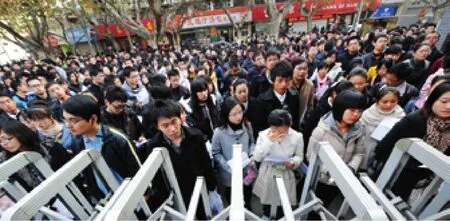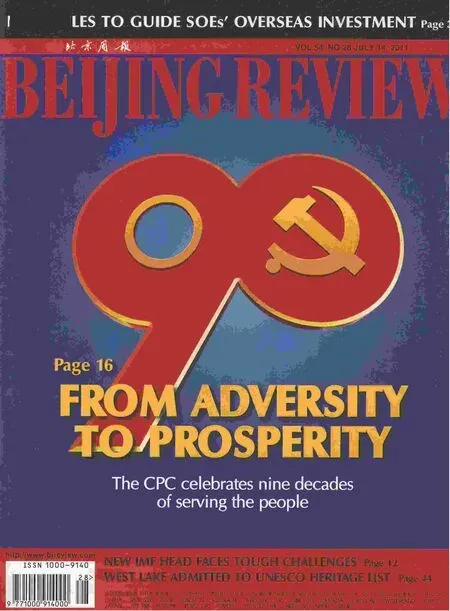Serving the People
By YIN PUMIN
Serving the People
By YIN PUMIN
The civil service is still popular but not as much as it once was

DREAM SEEKERS: Participants wait for the annual national civil service examination in Nanjing, Jiangsu Province on December 5
Chinese people in recent years have shown an increased interest in finding a “red-collar job,” a widespread Internet term nowadays meaning a public service job.
Official figures show the number of applicants for the national civil servant examination, which selects candidates for government departments, has surged from 87,000 in 2003 to 1.44 million in 2009.
This year, the exam again attracted more than 1.41 million qualified applicants, according to the State Administration of Civil Service (SACS).
A total of 137 central authorities and institutions plan to recruit 16,000 civil servants, some 1,000 more than the previous year.
The power that comes with the authority to distribute social resources and the bene fi ts attached to the positions are deep-rooted reasons for the fervor surrounding the exam,said Zhu Lijia, professor of public management at the Beijing-based Chinese Academy of Governance (CAG).
Being hot
“Iron rice bowl” is a Chinese term that means a stable occupation for life. It is a leftover from the planned economy now reserved mainly for civil servants.
Even today, civil service is among the most sought-after occupations in China due to its bene fi ts, including above-average salaries, various subsidies, little pressure and a stable work environment.
“Unlike in some developed countries where civil service is just a job where you serve the public, civil service positions in China, more often than not, enable one to have extra and invisible bene fi ts,” Zhu said.
China introduced the concept of public service in 1987 and promulgated the Interim Regulations on Civil Servants in 1993,launching the civil service system.
However, government jobs have not always proved attractive. In the 1980s many public servants gave up their “iron rice bowls” to go into business, and in the 1990s,as the government started to streamline its various organs, many talented people quit to pursue dreams of entering foreign companies or starting a business.
People say this entrepreneurial spirit has been a driving force in China’s fast social and economic development.
However, the past decade has seen a strong reverse in the fl ow of human resources from the private sector into government,not necessarily a good thing for the country.
“Government organs don’t directly create social wealth. If too many talents crowd toward public service, it will lead to an unbalanced distribution of human resources and snuff out the vigor of the market,” said Liu Xutao, a professor at the CAG.
He said applicants, especially college graduates, should turn to a technology and skill oriented labor market.
Public service jobs are highly sought after, with college graduates being the dominant force in recruitment, but a huge number of farmers and workers are deterred by their lack of academic quali fi cations.
The SACS said recruitment for the 2011 exam will give more chances to farmers and workers and increase the proportion of those who have more than two years of work experience.
In a new recruitment drive, for the first time the Central Government will recruit farmers and workers as civil servants for customs and taxation sectors. Railway police stations at county, township and village levels will also be included.
The fi rst batch of 171 farmers and workers took the exam on December 5, applying for 14 government posts.
“It is a breakthrough to recruit rural residents,” Liu said.
Cooling down
The 2011 national civil servant examination was conducted in 46 cities across the country on December 5.
The exam included an administrative aptitude test that focuses on logic, analytical and language skills. There is also an essay question to test understanding of social and political affairs. Both are considered necessary qualities to be a public servant.
Nie Shengkui, Director of the Examination and Recruitment Department of the SACS, said that 1.03 million people took the exam, fewer than last year’s 1.04 million.
It is the fi rst-ever decline in the number of examinees since the test was created.
At least 85 percent of jobs with the central authorities this year require more than two years of work experience at the grassroots level, 15 percentage points more than last year, which could dissuade college graduates from taking the exam, Nie said.
Grassroots work experience refers to work in government or Party departments of towns, villages or sub-district of fi ces, public institutions, companies, and communities.
Chen Yu, Director of the China Institute for Occupation Research at Peking University, said civil servants are using public resources to serve the public, so they should first understand the needs of the public.
“I don’t think fresh graduates should change their seats in classrooms to seats in government organizations. Experience at grassroots levels will help them on their career path, no matter what they do in the future,” he said.
Nie also said this year marked the first time more women than men took the exam,with the ratio of men to women standing at 0.97 to 1.
The results will be released in January 2011, and those who pass will be interviewed. The recruitment process will last until the end of March next year.

